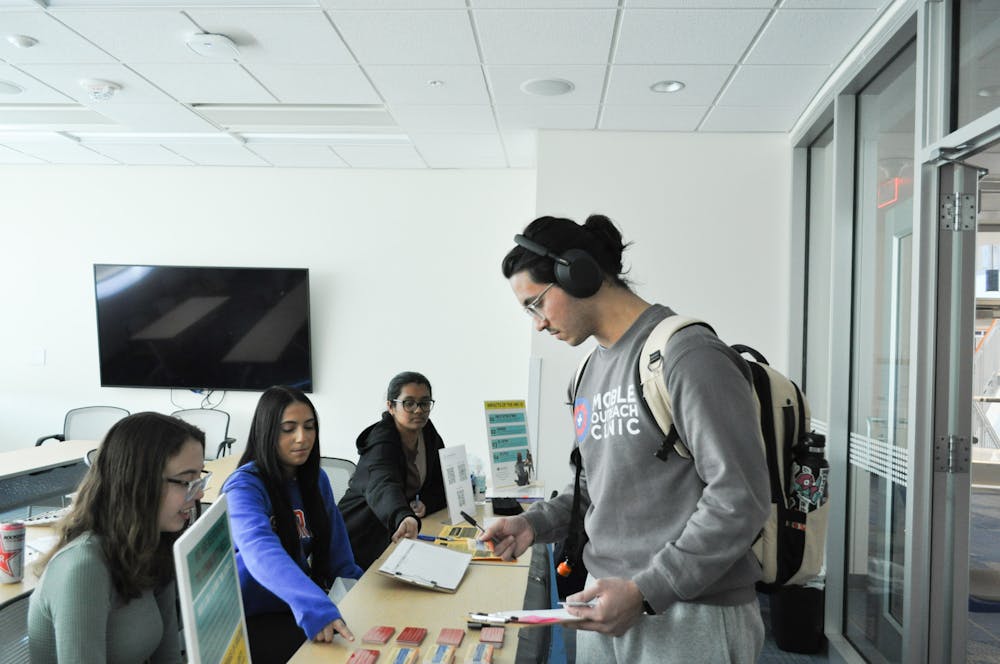A student smiles in front of a ring light as their photo is taken for a second form of personal identification. The stations around them are abuzz with documents being exchanged, verified and approved for the Human Rights Coalition’s first community ID drive at the Reitz Union.
The nonprofit organization usually operates its community ID drives out of Westminster Presbyterian Church for a predominantly Hispanic immigrant population. While it continues to do so, it recently brought the program a new demographic at UF as it works to bring solidarity between students and those who benefit from the program the most.
“We're hoping that a good number of UF students will get their community ID,” HRC program director Veronica Robleto said. “[We want] to help normalize it and expand the program and raise awareness about the reasons that it came about, and the things that people are facing in the community that sometimes students are a little removed from.”
The ID drive at UF also educated students on a development in Florida’s legislative sessions as part of the Senate Bill 1718 immigration package signed in May 2023: Florida hospitals that accept medicaid are obligated to ask patients about their immigration status. However, Robleto said the law also provides the right to deny answering that question in what they are calling a Decline to Answer campaign.
“We encourage everyone no matter what their status, even if you're a U.S. citizen, to decline to answer that question,” Robleto said. “We believe that the question itself is harmful, and it's already causing people to not seek medical care out of fear that they're going to be turned over to ICE or immigration authorities.”
Robleto said she already received many calls from immigrants worried about how their immigration status might affect their ability to receive healthcare.
“So you can't get denied medical care based on your immigration status,” Robleto said. “But nevertheless, it definitely enhances the existing situation of people being fearful towards institutions in general, that it's not safe for immigrants.”
The HRC planned the ID drive at the Reitz Union in collaboration with UF clubs and organizations including the Path to Purpose, Gators for Refugee Medical Relief and Central American Latino Organization.
For Jacob Booeshaghi, a UF biomedical engineering freshman who is involved with Path to Purpose, the collaboration came after a presentation Robleto gave to the Brown Center for Leadership and Service about the program.
“My group thought it would be great to host a community ID drive here on campus because the demographic of the community is mostly like populations who are immigrants,” Booeshaghi said. “I think there's a lot of stigma against immigrants. I wanted to do something about it.”
Booeshaghi said he wanted to continue the on-campus ID drives into the future, hoping that with a changed strategy, they could get more students engaged with the drive next time.
Estelle Erwich, a UF political science and international studies senior and president of UF Gators for Refugee Medical Relief, agreed. Erwich even went through the process of receiving an ID herself. While she, like many students, initially thought the process would be complicated, it turned out to be the opposite.
“I just have my driver's license and my ONE.UF, which I always have both of those available, and it took like five minutes,” Erwich said. “And now I have an ID, second form. So it's awesome. Super, super simple.”
GRMR’s efforts went beyond providing volunteers for the ID drive at the Reitz. At one of HRC’s regular ID drives at Westminster Presbyterian church, GRMR provided a free mobile health clinic for those who otherwise wouldn’t have had access.
“We got folks health screenings and referrals and vaccines,” Erwich said. “We try to normalize it with the student body and GRMR club members, just so that people are aware of what's going on in their community and get more involved.”
Thais Maradiaga, a UF public health senior involved with UF CALOR, described the importance of these ID drives for undocumented immigrants.
“It's important to me that people have social services and people are well connected to the things that they should be able to access in their community regardless of documentation status,” Maradiaga said.
Maradiaga also said these programs aren’t just for Spanish speakers like herself.
“In Miami, there's a large population of Spanish speakers, Creole speakers, different indigenous languages across Central and South America,” Maradiaga said. “I think kickstarting these kinds of programs in different counties would really make it more accessible. An immigrant doesn't just look like one thing, somebody who might need this ID doesn't just look like one thing.”
Lexi Crespin, the HRC’s social media intern and UF psychology junior, said a stigma has developed since it is mostly Hispanic-looking immigrants who apply for the ID. The key to resolving this, she said, is by getting college students involved.
“Having college students use it at a clinic or in the library, it opens more doors, makes it more acceptable and shows that it's an ID that can be used by everyone, not just for a specific population,” Crespin said. “It definitely destigmatizes it and shows our support for these people that still belong in this community.“
For those who need them, the community IDs are life changing. For Stephe Xhafaj, an HRC volunteer and UF behavior and cognitive neuroscience junior, supporting the HRC’s ID program means supporting a program that she wished she had when she first came to the U.S.
“Using a non-U.S. form of identification almost felt embarrassing,” Xhafaj said. “Having this sort of ID where everyone is viewed as equal and there's a destigmatized approach for everyone is something that is truly revolutionary to me, something I'm very passionate about.”
Contact Eluney Gonzalez at egonzalez@alligator.org. Follow him on X @Eluney_G.






